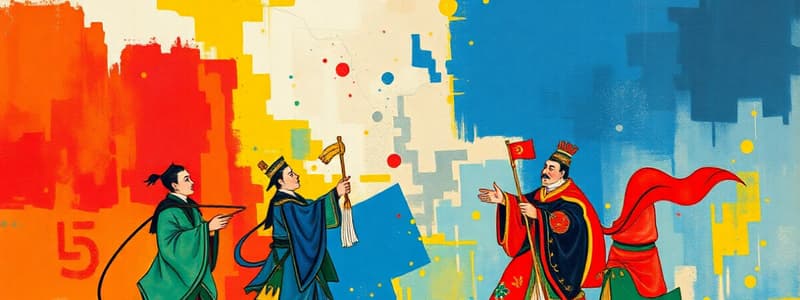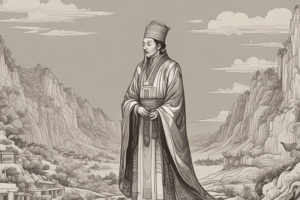Podcast
Questions and Answers
Which of these philosophers is NOT associated with Legalism?
Which of these philosophers is NOT associated with Legalism?
- Li Si
- Shang Yang
- Confucius (correct)
- Hanfeizi
What was a key belief of Legalism regarding human nature?
What was a key belief of Legalism regarding human nature?
- Humans are neutral and their nature is shaped by their environment.
- Humans are naturally cooperative and seek harmony.
- Humans are inherently selfish and require strict control. (correct)
- Humans are inherently virtuous and capable of self-governance.
What management technique did Legalism emphasize?
What management technique did Legalism emphasize?
- Fostering individual creativity and innovation.
- Utilizing rewards and punishments to motivate behavior. (correct)
- Promoting harmony through shared values and beliefs.
- Empowering individuals through democratic processes.
What was the primary goal of Legalist policies?
What was the primary goal of Legalist policies?
What did Legalists believe was the primary means of achieving social harmony?
What did Legalists believe was the primary means of achieving social harmony?
Which of these phrases is NOT a core principle of Legalism?
Which of these phrases is NOT a core principle of Legalism?
How did the Qin dynasty's implementation of Legalist principles contribute to its downfall?
How did the Qin dynasty's implementation of Legalist principles contribute to its downfall?
What was a significant consequence of the Qin dynasty's downfall?
What was a significant consequence of the Qin dynasty's downfall?
Flashcards
Legalism
Legalism
A Chinese philosophy advocating strict laws and state control for social order.
Warring States era
Warring States era
Period in Chinese history (475–221 bce) marked by conflict and philosophical development.
Shang Yang
Shang Yang
A key Legalist philosopher who contributed to the development of Legalist thought.
Li Si
Li Si
Signup and view all the flashcards
Hanfeizi
Hanfeizi
Signup and view all the flashcards
Three main precepts of Legalism
Three main precepts of Legalism
Signup and view all the flashcards
State control
State control
Signup and view all the flashcards
Qin dynasty
Qin dynasty
Signup and view all the flashcards
Study Notes
Legalism in Ancient China
- Legalism was a prominent school of Chinese philosophy during the Warring States era (475–221 BCE).
- It formed the ideological basis for the Qin dynasty (221–207 BCE).
- Influential Legalist philosophers include Shang Yang, Li Si, and Hanfeizi.
- Three main precepts of Legalism:
- Strict application of publicized laws (fa).
- Application of management techniques (shu), including accountability (xingming) and "showing nothing" (wuxian).
- Manipulation of political influence (shi).
- Legalists believe self-interest leads to personal gain, causing conflict. Thus, a strong centralized authority is needed for order and harmony.Social harmony is achieved through strong state control, not virtue of the ruler.
- Legalists advocated for a system of laws with strict punishments and rewards, directing all activity towards increasing ruler and state power.
- The Qin dynasty's brutal implementation led to its downfall and discrediting Legalist thought in China.
Studying That Suits You
Use AI to generate personalized quizzes and flashcards to suit your learning preferences.




